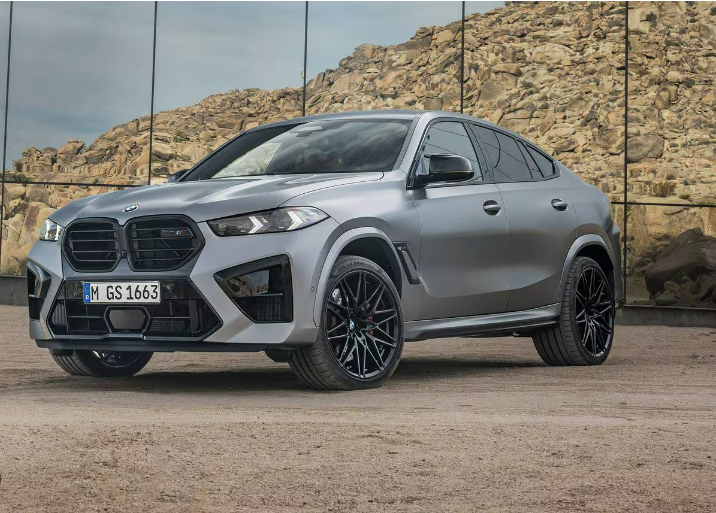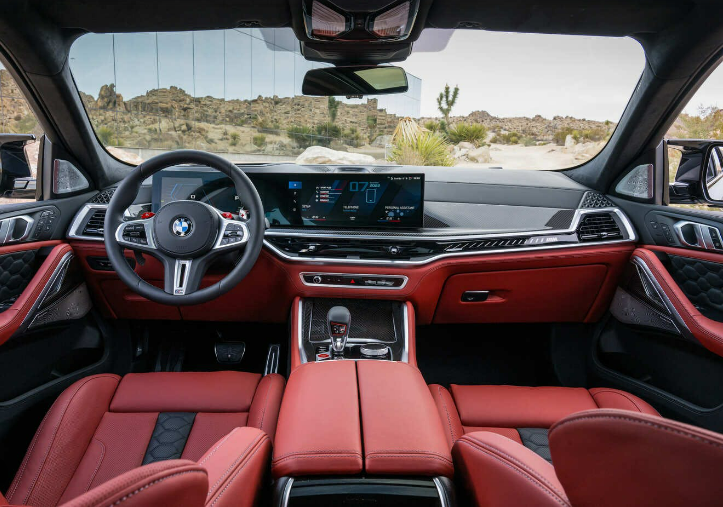2025 BMW X6 Reviews

Entering its sixth production year, the 2025 BMW X6 remains a stylish alternative to the more traditionally designed X5 SUV, offering a distinctive, sloped roofline that trades some cargo space and rear-passenger headroom for a sportier look. Inside, the X6 adheres to BMW’s design principles, combining high-quality materials with contemporary aesthetics and a modern technology suite, highlighted by a 12.3-inch infotainment screen.
The base xDrive40i model features a spirited 375-horsepower turbocharged inline-six engine, while the higher-performance M60i boasts a robust 523-horsepower twin-turbo V8. Both engines are paired with an eight-speed automatic transmission and standard all-wheel drive. For those seeking even more power, the X6 M, reviewed separately, offers 617 horsepower and an exceptionally sharp chassis.
Although the X6 played a pioneering role in the luxury “crossover coupe” segment, it now competes with other models such as the Porsche Cayenne Coupe and the Mercedes-Benz GLE-Class Coupe, which target similar buyers.
What’s New for 2025
The 2025 BMW X6 combines the sleek, coupe-inspired design with the strong foundations of a midsize luxury SUV, adding enhanced style and features. Starting at $75,675, it’s a distinctive choice in its segment.
While the X6 caters to a specific niche, it’s a compelling option if you’re drawn to its unique blend of aesthetics and performance. Building on the solid base of the X5 SUV, the X6 trades a bit of practicality for a striking, sporty appearance. BMW has equipped the X6 with a sportier suspension from the start, known for delivering an engaging drive without sacrificing daily comfort. The third-generation X6, introduced in 2020, has received updates over the years, but there are no major changes for 2025 following a mid-cycle refresh in 2024.
2025 BMW X6 Pricing
The 2025 BMW X6 starts at $75,675, with the top-tier X6 M60i priced from $95,475. Kelley Blue Book Fair Purchase Pricing indicates potential savings of $1,741 to $2,340 below MSRP, depending on the trim and equipment, with these figures updated weekly.
| MSRP | |
|---|---|
| xDrive40i | $75,675 |
| M60i | $95,475 |
Other options in this segment include the Mercedes-AMG GLE Coupe, beginning in the low $90K range; the new-for-2025 Genesis GV80 Coupe, expected to start around $70K; the Audi Q8, priced at approximately $75K; and the Porsche Cayenne Coupe, starting at about $85K.
Power, Ride, and Handling
The X6 xDrive40i, a popular choice, delivers 375 horsepower and accelerates from 0 to 60 mph in a swift 5.2 seconds. This performance outpaces the base Porsche Cayenne Coupe and is competitive with the more expensive Mercedes-AMG GLE 53 Coupe.
The performance only escalates with the X6 M60i and X6 M Competition, both featuring twin-turbocharged V8 engines. The M60i produces 523 horsepower, while the X6 M Competition cranks out an impressive 617 horsepower. Sometimes, more power is just what the driving enthusiast craves.
The xDrive40i’s turbocharged six-cylinder engine, combined with a finely tuned chassis, makes this SUV feel more like a luxury sports sedan. Its standard xDrive all-wheel drive ensures excellent traction in various conditions. The M60i not only benefits from a more powerful engine but also features an adaptive M suspension system, M Sport brakes, an M Sport differential, and Integral Active Steering for enhanced handling. The M Sport exhaust adds an exhilarating soundtrack.
The X6 M Competition, a pinnacle of BMW’s performance lineup, can outshine some sports cars on the track, despite its size.
While the X6 is a joy to drive, its sloping rear roofline affects rear three-quarter visibility. Thankfully, standard blind-spot monitoring helps mitigate this issue.
Fuel Economy
The X6 xDrive40i offers a respectable 24 mpg combined, significantly better than the Cayenne Coupe’s 19 mpg and the GLE Coupe’s 20 mpg combined. The X6 M60i xDrive achieves 19 mpg combined, while the X6 M Competition delivers 15 mpg combined.
Luxurious Interior

Inside, the X6 features classic BMW design with plush materials and impeccable fit and finish. Technology is front and center with a 12.3-inch digital driver display and a 14.9-inch infotainment touchscreen, both standard.
While the X6 is technically a five-seater, the center rear seat is better suited for occasional use. Rear legroom measures 35.7 inches, and rear headroom is 37.5 inches, slightly less than the X5. The cargo area offers 27.4 cubic feet of space, expanding to 59.6 cubic feet with the 40/20/40 split-folding rear seats down, compared to the X5’s 33.9 and 72.3 cubic feet. The X6’s design focuses on a different set of priorities, blending performance and style with a slightly smaller cargo and rear passenger space.
Coupe-Like Exterior
The BMW X6 pioneered the SUV coupe segment, although the Infiniti FX could also be considered an early entrant. Today, the X6 competes with models like the Porsche Cayenne Coupe, Mercedes-AMG GLE Coupe, the new-for-2025 Genesis GV80 Coupe, and the Audi Q8. While this distinctive style may not appeal to everyone, it offers a unique alternative to traditional SUV designs, giving buyers a stylish and dynamic option.
Engine & Transmission
The X6 xDrive40i is powered by a turbocharged 3.0-liter six-cylinder engine, delivering 375 horsepower and 395 lb-ft of torque. Power is sent to all four wheels via an 8-speed automatic transmission.
The performance-focused M60i and X6 M Competition models feature a twin-turbocharged 4.4-liter V8 engine. The M60i produces 523 horsepower and 553 lb-ft of torque, while the X6 M Competition generates 617 horsepower with the same amount of torque.
4-Year/50,000-Mile Warranty
BMW offers a standard four-year or 50,000-mile new-vehicle and powertrain warranty, which is typical for German luxury brands. This warranty includes roadside assistance with unlimited mileage. Additionally, scheduled maintenance is covered for three years or 36,000 miles, a benefit less common in the industry.
Safety Ratings
While the X6 has not yet undergone comprehensive testing by U.S. safety agencies, the closely related X5 has achieved top ratings. The X5 received “Good” scores in all major crash tests from the Insurance Institute for Highway Safety (IIHS) and earned four out of five stars overall from the National Highway Traffic Safety Administration (NHTSA).